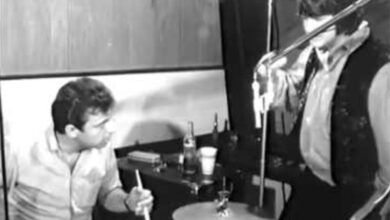Restored in 2024, Elvis’s 1970 performance still resonates as strongly as it did 55 years ago
Elvis Presley’s live performance of “In the Ghetto” at The International Hotel in Las Vegas in 1970 marked a pivotal moment in his career, showcasing not just his legendary musical talent but also his profound ability to connect with social issues through his art. The performance unfolded against the backdrop of a tumultuous era in America, a time marked by civil rights movements, protests, and growing awareness of societal challenges. “In the Ghetto,” a poignant ballad penned by Mac Davis, addresses the harsh realities of poverty and the cyclical nature of violence, themes that resonated deeply with audiences grappling with similar struggles in their own lives. Presley’s delivery during this performance was steeped in sincerity, allowing the audience to feel the weight of the lyrics as he conveyed a message of empathy and awareness.
At The International Hotel, Elvis had established a reputation for electrifying performances that reinvigorated his career following a period focused heavily on films. This venue had become an iconic setting for his live shows, hosting countless performances where his magnetic stage presence captivated fans. During these engagements, the atmosphere crackled with excitement as Elvis performed a mix of his classic hits and newer material, but “In the Ghetto” emerged as a standout moment. The juxtaposition of its serious themes against the glitzy Las Vegas backdrop made it a powerful highlight amid a lineup of upbeat rock ‘n’ roll numbers.
When Elvis first recorded “In the Ghetto” in 1969, it quickly climbed the charts and became a signature song for him. The poignant storytelling within the lyrics struck a chord with many, drawing attention to the neglect faced by those living in impoverished neighborhoods. By the time of his 1970 performance, the song had already cemented its place in popular culture. Presley’s deep emotional connection to the material allowed him to imbue the performance with a level of authenticity that captivated those in attendance. The sincerity of his rendition created a reflective moment that contrasted sharply with the surrounding spectacle of Las Vegas entertainment.
As he took to the stage, Elvis commanded the audience’s attention with his extraordinary vocal prowess. His ability to navigate the delicate verses of “In the Ghetto,” gradually building to powerful crescendos, showcased his vocal control and emotional depth. Accompanied by a talented band, including guitarist James Burton, whose signature riffs added an electrifying edge, the performance was further enhanced by the rich harmonies provided by The Sweet Inspirations and The Imperials. Their gospel-infused backing vocals not only complemented Elvis’s lead but elevated the song’s emotional resonance, creating a soul-stirring experience that left a lasting impact.
Elvis’s performance style was characterized by an intimate connection with his audience, and during “In the Ghetto,” he brought a quiet intensity that drew listeners into the narrative. Known for his iconic movements and charming charisma, he transformed the performance into a shared experience, allowing the audience to feel the story unfold. The palpable emotion in his voice resonated throughout the venue, bridging the gap between performer and audience, and reinforcing the song’s message of compassion and understanding.
This particular performance marked a significant chapter in Elvis’s career as he made a triumphant return to live performing after focusing on a series of movies. The Las Vegas engagement was pivotal, revitalizing his image as a serious artist capable of delivering impactful music. Fans, both loyal and new, flocked to see him perform, and the emotional weight of “In the Ghetto” helped establish his credibility as an artist who was not only an entertainer but also a storyteller deeply attuned to the societal issues of his time.
As the years have passed, “In the Ghetto” has endured as one of Elvis Presley’s most memorable songs, reflecting his ability to convey a meaningful message through music. The themes of hardship and social justice that the song addresses continue to resonate with audiences today, highlighting the timeless nature of its message. In a world where social issues remain prevalent, Elvis’s performance serves as a reminder of the power of music as a tool for reflection and change.
Elvis Presley’s contributions to the music industry were groundbreaking, spanning multiple genres and styles. His ability to blend rock, pop, and gospel influences not only set the stage for future artists but also established him as a cultural icon. “In the Ghetto” is a testament to his versatility as an artist, demonstrating that he could deliver not only energetic rock anthems but also deeply moving ballads that challenge societal norms and provoke thought.
Ultimately, the performance of “In the Ghetto” at The International Hotel stands as a testament to Elvis’s enduring legacy, showcasing his role as the King of Rock ‘n’ Roll while also highlighting his capacity for empathy and insight into the human experience. Through this performance, he reminded audiences of the power of music to inspire change, to connect deeply with listeners, and to shine a light on the struggles faced by many. In doing so, Elvis Presley solidified his status not just as an entertainer but as an artist with a profound understanding of the world around him, leaving an indelible mark on music and culture for generations to come.
Elvis Aaron Presley was born on January 8, 1935, in Tupelo, Mississippi, and rose to fame in the 1950s as a pioneering figure in rock and roll music. His distinctive voice, charismatic stage presence, and groundbreaking style earned him the title of the King of Rock ‘n’ Roll. Blending various genres, including country, blues, and gospel, Elvis became a cultural icon whose influence transcended music. He starred in numerous films and became known for hits like “Heartbreak Hotel,” “Jailhouse Rock,” and “Hound Dog.” Elvis’s performances, marked by his signature dance moves and powerful vocals, captivated audiences worldwide, making him one of the most celebrated artists in music history. His legacy endures, influencing countless musicians and continuing to resonate with fans around the globe.





